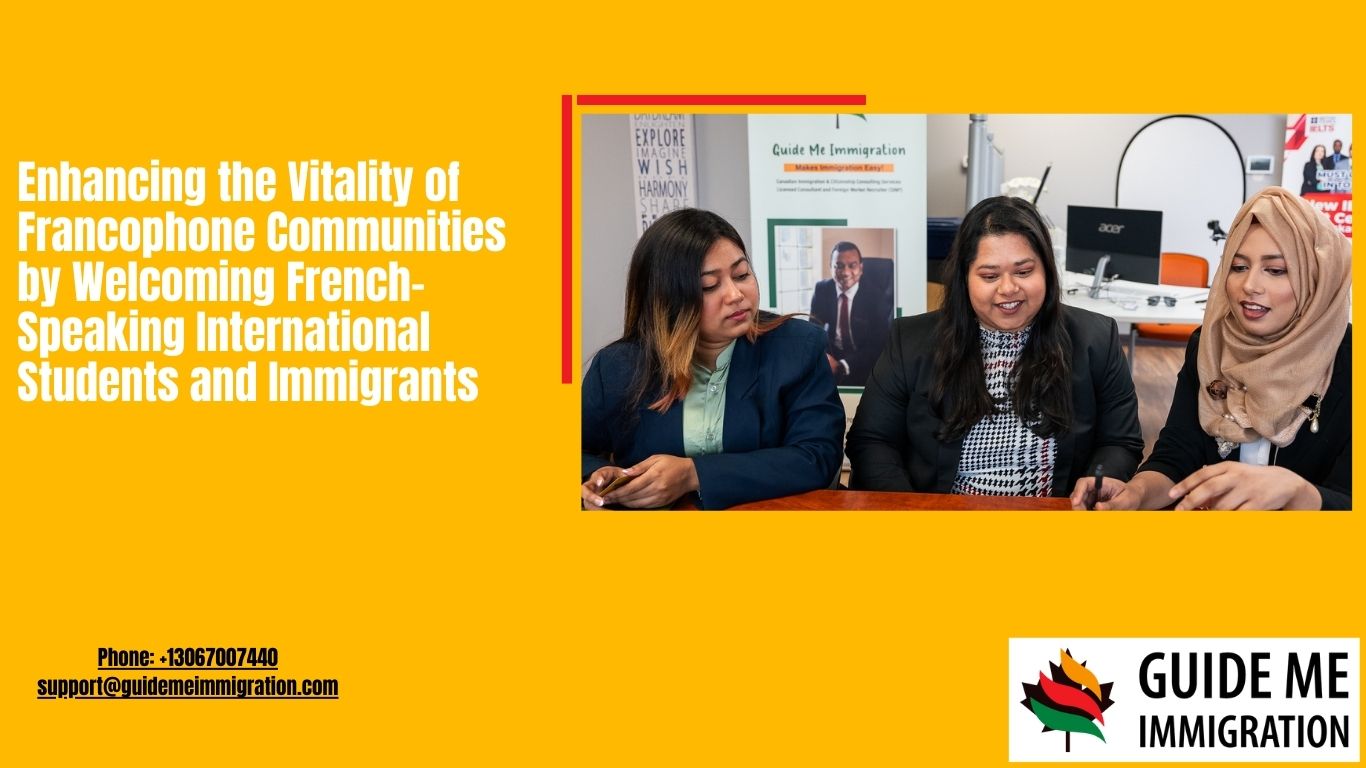Enhancing the Vitality of Francophone Communities by Welcoming French-Speaking International Students and Immigrants
In recent years, Canada has been at the forefront of initiatives designed to celebrate and support its rich multicultural tapestry. As a nation renowned for its diversity and inclusive spirit, Canada is now placing a significant emphasis on strengthening its Francophone communities. The introduction of the Francophone Minority Communities Student Pilot (FMCSP) program and the expansion of the Welcoming Francophone Communities (WFC) initiative are pivotal steps in this direction. This blog post will delve into these exciting developments, explore their implications, and discuss how they will enhance the vitality of Francophone communities across the country.
The Francophone Minority Communities Student Pilot Program
Launched by the Honorable Marc Miller, Minister of Immigration, Refugees and Citizenship, on August 14, 2024, the FMCSP is a groundbreaking initiative aimed at enriching Canada’s Francophone minority communities. Set to commence on August 26, 2024, this program represents a major leap forward in making Canadian post-secondary education more accessible to French-speaking international students, particularly from regions where study permit approval rates have historically been low.
Key Features of the FMCSP Program
- Increased Access for International Students: Historically, students from French-speaking regions such as Africa, the Middle East, and the Americas have faced significant barriers when applying for study permits. The FMCSP addresses these challenges by simplifying the application process and making it more equitable. Students and their families will no longer need to prove their intention to leave Canada after their studies, a requirement that often posed a hurdle for applicants.
- Adjusted Financial Thresholds: The program recognizes the economic realities faced by international students. It lowers the required financial threshold to 75% of the low-income cut-off for the municipality where the institution is located, making it more feasible for students from diverse backgrounds to study in Canada.
- Pathway to Permanent Residency: One of the most promising aspects of the FMCSP is the direct pathway it offers from temporary to permanent residency. This feature will not only attract international students but also encourage them to contribute long-term to the Canadian economy and Francophone communities.
- Support Services: While studying in Canada, students will have access to settlement services to help them integrate into their new environment. This support is crucial for ensuring that they feel welcomed and can thrive academically and socially.
Impact on Francophone Minority Communities
The FMCSP is expected to have a profound impact on Francophone minority communities (FMCs) across Canada. By attracting a diverse group of French-speaking students, the program will enrich the cultural and linguistic landscape of these communities. Graduates from the FMCSP will bring their skills and knowledge to the Canadian workforce, contributing to the economic development of FMCs and reinforcing their cultural vibrancy.
Furthermore, the program aligns with Canada’s broader goals of promoting linguistic duality and supporting the growth of French-speaking populations outside Quebec. It also enhances the visibility and appeal of FMCs, making them more attractive to future immigrants and students.
Expansion of the Welcoming Francophone Communities Initiative
In addition to the FMCSP, Canada is also expanding the Welcoming Francophone Communities (WFC) initiative. This expansion involves the inclusion of ten new communities, bringing the total number of WFCs to 24. These communities have been selected based on their potential to foster a welcoming environment for French-speaking newcomers and support their integration.
New Communities Added to the WFC Initiative
The new WFCs include:
- British Columbia: Nanaimo
- Manitoba: Red River (Ritchot, Salaberry, Montcalm, and St-Pierre-Jolys)
- Nova Scotia: Chéticamp (including St. Joseph du Moine)
- New Brunswick: Belle-Baie (including Bathurst and the Pabineau First Nation), Caraquet (including Rivière du Nord and Hautes-Terres), and Restigouche West Region (Saint-Quentin and Kedgwick)
- Saskatchewan: Prince Albert
- Ontario: Cornwall, Cochrane District (Route 11 Corridor), and London
Significance of the WFC Expansion
The expansion of the WFC initiative underscores Canada’s commitment to creating inclusive environments for French-speaking immigrants. These new communities have demonstrated a strong potential for supporting Francophone integration through local engagement, community support services, and a welcoming atmosphere.
By bolstering the infrastructure and services available to French-speaking immigrants, the WFC initiative aims to make the transition to life in Canada smoother and more positive. This initiative is instrumental in enhancing the overall appeal of Francophone communities as vibrant places to live, work, and grow.
Quotes from Key Figures
The announcement of these initiatives has been met with enthusiasm from various stakeholders:
- The Honorable Marc Miller stated, “Promoting French is of prime importance to us. By welcoming Francophone immigrants and supporting them in their integration process, we contribute to the revitalization of these communities while meeting their skilled workforce needs.”
- The Honorable Randy Boissonnault emphasized, “Supporting the vitality of our Francophone communities in Canada also means welcoming French-speaking international students and immigrants. This is exactly what this pilot program does.”
- Liane Roy, president of the Fédération des communautés francophones et acadienne du Canada (FCFA), highlighted the importance of local efforts in supporting French-speaking immigrants: “The WFC initiative is an eloquent example of the commitment of Francophone and Acadian communities to the overall success of immigrants.”
The introduction of the Francophone Minority Communities Student Pilot program and the expansion of the Welcoming Francophone Communities initiative mark significant steps forward in enhancing the vitality of Francophone communities across Canada. These initiatives are designed to attract and support French-speaking international students and immigrants, thereby enriching the cultural and economic fabric of these communities.
As Canada continues to embrace its multicultural identity and strengthen its linguistic diversity, these measures represent a commitment to fostering an inclusive and dynamic environment for all. By welcoming French-speaking newcomers and providing them with the tools and support they need to thrive, Canada is not only celebrating its heritage but also building a brighter future for its Francophone communities






